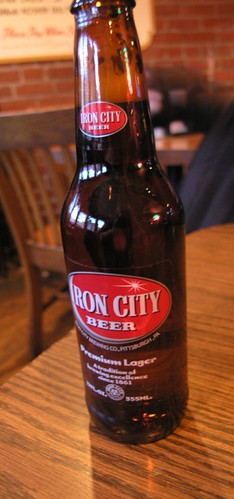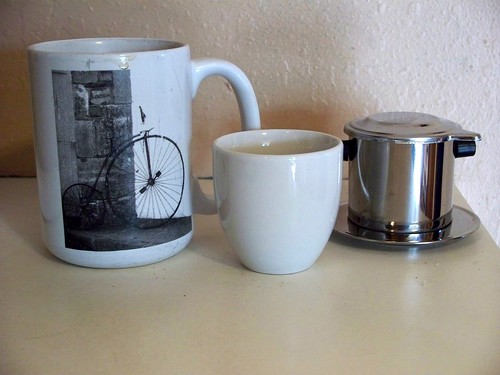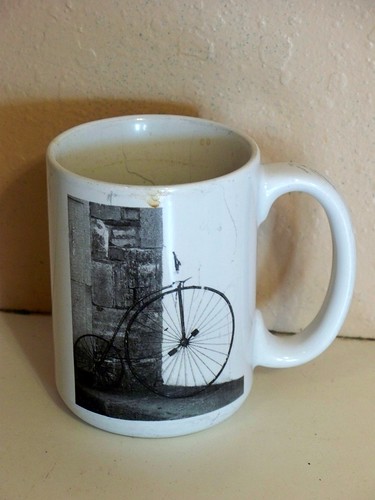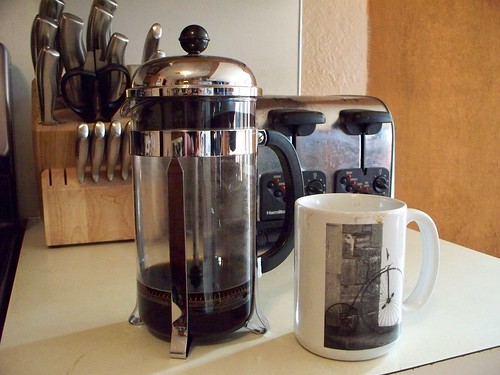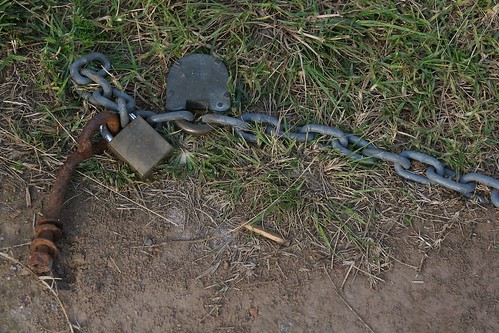
It was like a Monty Python sketch, only more surreal.
I said to the security guard, "What happened to my bike?"
"Two kids came along and said it was theirs," he replied.
"They cut the lock off right in front of you!"
"They said it was theirs."
"You saw me lock it up here this morning and every morning this week!"
"They said it was theirs."
So much for the dubious intellectual skills of security guards.
I'd purchased the bike, an all-steel Kalkhoff, a little more than a year earlier. It was my daily transportation during my last year in college, and it continued in that role after I landed my first job working in a Catholic teaching hospital. Faced with the prospect of living with my parents in the suburbs or living near work so I could use public transportation, walk, or ride my bike, I chose to live in the city. I made enough money for an apartment or a car, not both.
The hospital had no bicycle parking, so I naively assumed the bike would be safe locked to a fence next to the security guard's post. Granted, the cable lock wasn't the best security, but it was adequate for a small town college. I made another bad assumption thinking it would be OK for use in Pittsburgh as well.
The bike came from the budget end of the shop. I really wanted a Schwinn Continental or Super Sport, but even the Varsity, the ubiquitious Norway rat of bicycles, was out of my price range. The Kalkhoff came with steel rims, Weinmann center pull brakes, a steel cottered crank, and plastic Simplex derailleurs. The saddle was an unpadded plastic abomination designed by the Marquis de Sade.
If looks could kill, the security guard would have been drawn and quartered. His head would have been on a pike outside the hospital gate. This kind of thing is generally discouraged these days. Still, it made for a satisfying fantasy as I trudged off to the police station to report the theft. Naturally, it was in the opposite direction from my apartment. It would be a very long walk home.
A few days later, I received a telephone call from the desk sergeant at the station. They recovered my bike! After work, I fairly bounced along the sidewalk. I identified myself at the front desk, and an officer escorted me to a storeroom. My bike and several others were leaning against the wall. When I asked where they found it, the officer laughed and said, "Oh, we didn't have to find it. The two boys who took it brought it into the station. As they were taking it from the hospital, their priest saw them with the bike, caught up to them, and told them if they didn't turn it in he'd read their names out in church."
I didn't realize it then, but this was a big deal. The boys faced not only the wrath of their priest and their parents, but the theft threatened to bring shame on their families as well. Knowing the neighborhood, there probably wasn't much chance of merely getting off with a stern talking-to. They'd likely take a beating or two and get blamed for every stolen or missing article for a long time. Once lost, trust is hard to regain.
But that's not the end of the story.
I bought another lock and a much heavier, case-hardened chain. And I started bringing my bike inside the building, thinking that would be more secure. Another character enters the story here, Mr. Berman, the hospital administrator in charge of my wing. I brought the bike up in the elevator a few times until he heard of it and informed the elevator operators that my bike was not to be transported. (This was an old building with manually-operated elevators.)
This began a cat-and-mouse tale that ran for a few months. I locked up the bike in an interior courtyard. Berman found it and ordered it removed. I locked it inside the projection booth in the auditorium. He found it. I hid the bike inside the basement laundry room. He phoned my supervisor and I had to take it out. I put it in a cubby hole in the sub-basement next to the morgue. Surely, no one there would complain. Berman found it. Finally, his frustration boiled over and he told me that the bike could not be brought into the building - anywhere - anytime.
I'd actually enjoyed finding new hiding places and I didn't want to leave the bike outside again, subject to the avarice of passersby and the dutiful inattention of so-called security guards. So I went to talk to Sister Adele, the hospital's executive director.
This was a Catholic teaching hospital, as I said before, and each department had a nun as its overseer. I didn't know many of their names since they traveled in much loftier circles than I, so I thought of them according to their jobs. We had Sister Mary Medical Records, Sister Mary Pharmacy, and even Sister Mary X-Ray. But Sister Adele was the Capo de Capos, the head of them all. She was a tiny little woman with a constant smile. Every Sunday morning, she walked the floors, never missing one as she inspected 'her' hospital.
I made an appointment and went to her office. I explained the bike problem and described what I'd done to avoid any further thefts. Sister Adele listened patiently, then said, "Let me see if I can get the city to install a bike rack in the new parking garage." The city had just finished construction a week or two earlier. I thanked her and left, figuring that I'd never hear about it again.
She called me an hour later. "The city agreed to put a bike rack in the garage," she said sweetly. "Will that take care of the problem?"
"Yes, sister," I stammered. "Thank you. When will they do it?"
"Oh, tomorrow morning. There isn't time to get it done today."
That's when I realized this tiny, sweet woman weilded some truly awesome authority. She had tremendous horsepower. Whenever I worked Sunday mornings, I greeted her with a cheery "Good morning, Sister!" It was best to stay on her good side.
Labels: stolen bicycle
